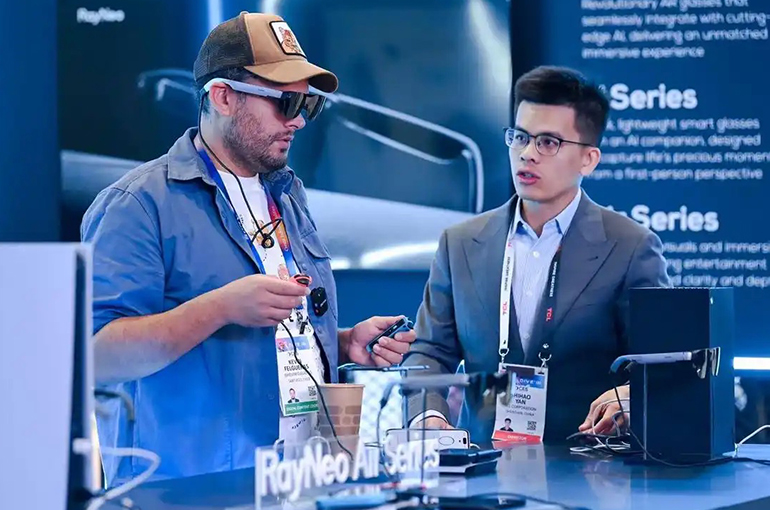 AI Glasses Still Need Time Before Starting Mass Production, Insiders Say
AI Glasses Still Need Time Before Starting Mass Production, Insiders Say(Yicai) Aug. 11 -- Although many Chinese companies have launched new artificial intelligence glasses in recent years, only a few have achieved mass production due to several persistent issues, including practical functionality, raw material costs, and supply chain integration, according to several industry insiders.
Making AI glasses is quite challenging because the supply chain has not fully matured yet, Cui Haitao, chairman of Guangzhou-based Goolton Technology, told Yicai. Although "we have been working hard for seven or eight years, achieving mass production is not as easy as we imagined."
This year, AI glasses have been very popular at the International Consumer Electronics Show, the World AI Conference, and other big events, with Chinese tech giants, including Xiaomi, Alibaba Group Holding, and China Telecom, releasing new products over the past two months. However, the market still lacks users, and few traditional eyewear retailers sell such glasses.
Although the hardware specifications of Xiaomi's AI glasses are quite good, consumers are likely to return the CNY2,000 (USD278) product after finding that its practical functions are limited, and it's more like a toy, noted Sun Yanbiao, chairman of Chaodian Think Tank. This phenomenon is common with other such items sold online, Sun added.
Consumers have overly high expectations for the functionality of AI glasses, hoping they possess powerful computing capabilities to handle numerous tasks while also being stylish to wear, putting manufacturers in a difficult position, Cui pointed out.
In addition to the gap between user experience and expectations, the immaturity of the supply chain, including chips, edge AI algorithms, and materials, also limits the rapid development of AI glasses, Cui said. The integration of the entire supply chain still faces challenges, with some manufacturers still using smartphone parts, resulting in issues such as excessive size and high power consumption, Cui added.
AI glasses with fast feedback and capable of taking high-quality photos require powerful main control chips, noted Hu Jun, chairman of Shenzhen Coding IOT Technology. However, the capabilities of existing chips are insufficient, making it difficult to balance high computing power and low power consumption, leading to users quickly draining the battery and overheating issues when continuously using AI functions, Hu pointed out.
AI glasses typically weigh around 40 to 50 grams but encompass multiple components, including chips, storage, sensors, optical modules, speakers, structural parts, lenses, and batteries.
"No manufacturer has integrated all aspects of AI glasses configuration, including materials, optics, hardware, software, systems, and algorithms," said Cui, adding that phone AI models are still being used due to glasses having no dedicated algorithm.
"If there is no capability to span the entire supply chain, it will be very challenging to integrate the AI glasses supply chain, making it difficult for the tech used in various segments to seamlessly integrate," according to Cui.
The high cost of display modules also hinders the mass adoption of AI glasses, with a single Micro light-emitting diode lens costing over CNY1,000, or over CNY2,000 for both lenses needed, Hu pointed out. This lifts the products' price beyond what most consumers can afford.
RayNeo's new AI glasses with Micro LED lenses cost around CNY14,000 (USD1,950), a price most consumers cannot afford, Hu said. "AI glasses with image display functionality will be difficult to achieve large-scale adoption within the next two years," or before the cost of raw materials drops, Hu stressed.
China's AI glasses shipments will likely surge over 200 percent this year from the 800,000 units, mainly basic audio AI glasses, shipped last year, according to Runto Technology. Global shipments are expected to soar 217 percent to almost 10 million units.
Editors: Tang Shihua, Martin Kadiev